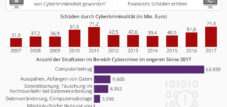+++ 23.4 million German victims of cybercrime +++ Every second internet user a victim of cybercrime +++ Every second person is afraid of cybercrime +++ Americans fear attacks from the internet +++
23.4 million German victims of cybercrime
Norton Cyber Security Insights Report counts 978 million victims of cybercrime in 20 countries last year, including 23.4 million from Germany. These victims suffered a total loss of US$172 billion, averaging US$142 per case. The most common forms of internet crime are viruses, stolen passwords, and credit card fraud. According to the study, victims of cybercrime are characterized by increased carelessness. Compared to those who were not victims, they were, for example, almost twice as likely to use the same password for all their online accounts.
One in two internet users is a victim of cybercrime.
Suddenly, your social media profile appears twice – only the new one is sending spam. Your computer blocks it and says it can only be reactivated upon payment. You paid in advance for your last online purchase and never received the goods. Cybercrime has many faces; every second internet user fell victim to some form of cybercrime last year.
This is shown in a recent survey by the digital association Bitkom . The most frequent problem, as the Statista graphic illustrates, is the infection of one's own computer with malware. Nineteen percent report that their login credentials for social networks or online shops were stolen. Eight percent were affected by severe insults, and five percent were sexually harassed online.
Nevertheless, two-thirds of those affected take no action. Reasons given include 45 percent of respondents believing the perpetrator will never be found, 34 percent finding the effort simply too high, and 13 percent believing that the police and public prosecutor's office do not take cybercrime seriously.
One in two people is afraid of cybercrime.
One in two internet users in Germany fears cybercrime: This is the finding of a recent survey . However, Germans also see positive aspects to digitalization.
In the survey, Ipsos differentiated between internet experts and novices. 56 percent of novices stated that digitalization had increased their fear of cybercrime. Among experts, this figure was 48 percent. However, nearly half of the experts (45 percent) also see digital transformation as an inspiration to face new challenges. Only 21 percent of novices share this view, as the Statista graphic illustrates.
In contrast, the fear of job loss due to digitalization is not very widespread: only 11 percent of internet experts and 15 percent of ordinary users fear such an impact.
Americans fear attacks from the internet
On March 15, 2017, attackers gained access to thousands of Twitter accounts, including many belonging to celebrities. The hijacked accounts then spread identical hate messages in Turkish. This relatively harmless incident demonstrates once again that cyberattacks from abroad pose a real threat. A survey conducted by the Pew Research Center in January also confirms that this is a cause for concern. According to the survey, 71 percent of US citizens polled consider such online attacks a major threat. Only the Islamic State was perceived as more threatening by the study participants. But online attacks are also a concern in Germany, as another survey by the same institute from last year shows. 66 percent of Germans surveyed stated that they consider cyberattacks from other countries a major threat.


